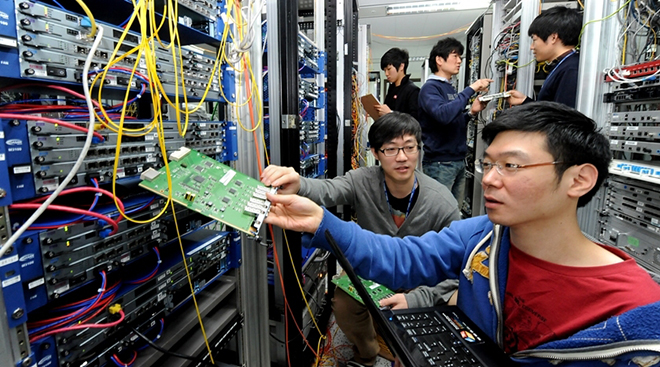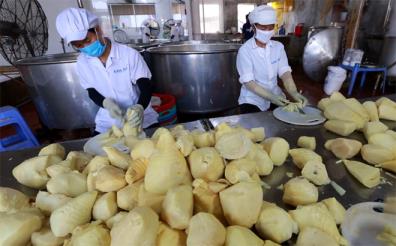About seven years ago, when the government promulgated Vietnam’s Economic Restructuring Plan for the 2016-2020 period, the words of "digital economy” and "digitalisation” remained relatively new concepts to policymakers, the government, ministries, including many people and enterprises.
However, these have risen to become some of the highlighted words in the nation’s guidelines, directions, and socioeconomic development plans, especially in the Economic Restructuring Plan for the 2021-2025 period, with an overall target to turn Vietnam into a country which is strong in the digitalisation of many economic sectors.
The National Assembly’s Resolution on Socio-economic Development for 2021-2025, has set a target to achieve an annual economic growth rate of 6.5-7% and developing Vietnam into a higher middle-income country by 2025.
Under this resolution, by 2025 per capita GDP is expected to be 4,700 – 5,000 USD, while the ratio of the processing and manufacturing industry in GDP is set to be over 25%; the ratio of digital economy in GDP is set to be 20%; and the ratio of total factor productivity in economic growth will likely reach 45% by 2025. Labour productivity is projected to increase over 6.5% every year.
Shoring up digital transformation
At the 2021 Global Trade in Services Summit, held online last September, Prime Minister Pham Minh Chinh stated that as countries are facing the collective impacts of the COVID-19 pandemic, climate change, and depletion of natural resources, stronger international cooperation and effective application of digital technology are among the key solutions.
"This will create new drivers for economic growth and recovery, thus ensuring sustainable, inclusive, and comprehensive development. Moreover, stepping up cooperation in digitalisation, is a key contributor to an environment of peace, stability, cooperation, and development, among countries and peoples across the world,” PM Chinh said.
"Vietnam has long been aware of the importance of digitalisation. Accordingly, we have been accelerating the digital transformation of the economy, and the development of a digital economy and society.”
Inspired by huge benefits from digital transformation in the context of the Fourth Industrial Revolution, taking place all over the world and having positive impacts on domestic production and business activities, including economic growth, the Vietnamese government promulgated the Programme on Economic Recovery and Development last month.
This hallmark programme underscores the urgent need to phase out all obstructions against people, businesses, and investors, via the boosted application of high technology and digital transformation in all administrative procedures, which will help improve the economy’s competitiveness.
PM Chinh has also underlined the accelerated deployment of the National Digital Transformation Programme, passed by the government in mid-2020. The Ministry of Information and Communications has been tasked to coordinate with other ministries, agencies, and localities, in order to quicken the implementation of this programme, the National Strategy on E-government Development for the 2021-2025 period, and the National Committee on Digital Transformation.
In early January 2022, the government also enacted Resolution No.01/NQ-CP on major tasks and solutions, guiding the realisation of the socioeconomic development plan in 2022. This resolution also highlighted the urgent need to "boost national digital transformation and innovation, build up a digital economy, and a digital society, in a practical and effective manner. It is necessary to boost the pilot application in some businesses, products, and service models with new technologies, and to create the best conditions for the breakthrough development of some sectors, including tourism, service, transport, and logistics, with all procedures to be simplified.”
Also, under Vietnam’s Socioeconomic Restructuring Plan for 2021-2025, when a relatively high economic growth rate of 6.5-7% has been set, the National Assembly underlined that digital transformation "will be drastically deployed, with the construction of a digital economy, a digital government, and a digital society, in the 2021-2025 period.”
This plan targeted that during 2021-2025, the nation’s average labour productivity will annually expand 6.5%, and the manufacturing and processing industry will annually climb 6-7%. Labour productivity is projected to increase over 6.5% annually. Contribution of the total-factor productivity (TFP) to GDP will be 45% by 2025. TFP is a measure of the efficiency of all inputs in a production process. Increases in TFP usually result from technological innovation or improvements.
"The three pillars of the digital transformation process are digital government, digital economy, and digital society, with an emphasis on a robust relationship between the public and the private sector,” said PM Chinh.
As an ASEAN member with robust economic growth, Vietnam has a network of 17 free trade agreements with over 60 partners, a domestic market of around 100 million people, the majority of which is made up of young people, and an innovation-driven mindset that is highly responsive to digital technologies.
"Taken all together, Vietnam has vast untapped potential in developing its digital economy. At present, nearly 70% of Vietnamese people are Internet users, and Vietnam is among the fastest growing countries, in terms of digital evolution momentum,” the prime minister said.
Vietnam has set a goal to become one of the top 30 countries in the world for digital access, with the vast majority of its population to gain access to mobile devices and the internet, in the near future.
The Ministry of Public Security has almost accomplished the digital national citizen ID database, a firm groundwork for the next step of the digital transformation process.
Governor of the State Bank of Vietnam Nguyen Thi Hong recently said investment capital in digital transformation projects has reached around 661 million USD annually. Up to 90% of all banks in Vietnam have set up and operated their own digital banking systems.
For example, on March 7, BAC A BANK officially launched a new payment method with VietQR code on BAC A BANK Mobile Banking application, in a bid to provide a more convenient payment solution for users.
Specifically, the swift money transfer feature with VietQR code, helps customers transfer money from an account opened at BAC A BANK to another bank account in the Napas’ network, through a 24/7 fast money transfer method, with a maximum limit of each transaction up to 21,740 USD, just by scanning the QR code for personal payment.
With this feature, BAC A BANK’s customers are much more proactive in money transfer transactions, because they only need to scan the beneficiary’s QR code instead of having to fill in detailed information, such as account number, account holder name, beneficiary bank, and amount to be transferred. All transaction information is processed automatically and accurately, helping limit risks and errors in information input.
"Many businesses like BAC A BANK have been applying high technology and digital transformation, and this has become a big tendency in Vietnam,” said Kieu Nguyen Viet Ha, head of the Ministry of Industry and Trade’s (MoIT) Department of Science and Technology. "Many big enterprises have been successful in digital transformation, such as Electricity of Vietnam, Rang Dong Light Source and Vacuum Flask joint Stock Company (RALACO), Vietnam National Coal and Mineral Industries Group, Hanoi Beer Alcohol and Beverage joint Stock Corporation, and Vietnam Industrial Construction Corporation, among others.”
For example, since 2012, RALACO has become one of the companies in Vietnam investing heavily in digital transformation via high-tech applications, with 20% of its annual pre-tax profits used for research and development activities.
Upcoming big programme
The MoIT recently submitted to the government, a draft programme on assisting industrial businesses, in the application of Industry 4.0 technology through digital transformation, for smart manufacturing development until 2030.
Under the draft programme, as much as 36% of domestic enterprises will carry out digital transformation in an effective manner by 2025, and the rate will expand to 85% by 2030. In addition, the rate of firms with breakthrough digital transformation will reach 12% by 2025 and 32% by 2030.
The rate of enterprises that have projects with digital transformation and Industry 4.0 technology application, that are assisted by the programme’s experts, will stand at 10% and 30% by 2025 and 2030, respectively.
To reach these goals, the MoIT proposed a series of measures, including the promulgation of criteria on specifying digital transformation levels among businesses, as this will make it easy for the government to grant incentives to these firms.
Related ministries will detail all the incentives and preferential mechanisms and policies for industrial businesses.
Ha of the MoIT, who directly drafted the programme, said that digital transformation will help firms to participate in a more convenient manner in the global supply chain, cooperate with foreign partners, and improve their competitiveness as well.
"Businesses will also be able to obtain new values in building up new models and new products and services. They will also be able to swell their capacity to gratify their customers and partners, while also improving their own corporate governance capacity,” she said.
NDO








